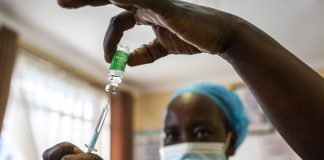
By XINHUA

Kenya is banking on speedy administration of a second dose of COVID-19 vaccine to tame the virus spread amid surges in western parts of the country that have exerted strain on public health infrastructure, a senior health official said on Thursday.
Willis Akhwale, chair of the COVID-19 vaccine task force said the government has intensified procurement of additional doses from bilateral partners to ensure that COVID-19 booster shots are administered on time.
Akhwale, who spoke during a live interview on local television, said Kenyans who received the first dose of COVID-19 vaccine will get the second one before the expiry of 12 weeks as recommended by the World Health Organization (WHO).
“The government is committed to ensuring that second COVID-19 vaccine doses are administered to all eligible persons within a shorter time frame as additional stockpiles arrive in the country,” said Akhwale.
Kenyan on Monday received 358,000 AstraZeneca vaccines donated by Denmark to boost ongoing administration of second doses targeting high-risk groups like health workers, the elderly and the terminally ill.
Akhwale said the vaccine doses had already been deployed to nine regional centers countrywide while eligible persons will be informed via short message service (SMS) when their turn for inoculation was due.
He said the government had invested in the training of health workers and the establishment of cold chain facilities to facilitate the seamless roll-out of the second phase of immunization against COVID-19.
Statistics from the Ministry of Health indicate that 203,905 Kenyans had received their second dose as of Wednesday while healthcare workers led the pack followed by people aged 58 years, teachers and security officers.
Nearly one million Kenyans have already received the first dose of COVID-19 vaccine as the government races against time to ensure they do not miss on the second one amid a supply crunch.
Akhwale said that vaccine uptake has been encouraging, adding that the government was confident of acquiring additional doses from diverse sources to ensure booster shots were available from July.
“Once the additional doses arrive, we will alert citizens who received the first dose to visit inoculation sites within their vicinity to receive the booster shots,” said Akhwale.
He said the Ministry of Health will also publish names of all vaccination sites while embarking on public education to boost uptake of second doses among eligible citizens.
Akhwale said that western Kenyan counties that are the new COVID-19 hotspots will be prioritized in the second phase of vaccination to minimize pressure on health facilities.
Kenya commenced the roll-out of the second phase of COVID-19 vaccination late May after receiving donations from the Democratic Republic of the Congo (DRC) and South Sudan.
The east African nation had planned to complete administration of second doses of AstraZeneca vaccine by July but the global supply crunch occasioned by the crisis in India stalled the process.
Akhwale said that replenishment of COVAX facilities by several wealthy nations will boost Kenya’s quest to administer second doses to all citizens who received the first one between March to May.
Susan Mochache, Principal Secretary in the Ministry of Health said that Kenya is among African countries that had registered optimal vaccine uptake, adding that ongoing discussion with multilateral bodies will help tackle supply bottlenecks.
According to Mochache, the government had set aside adequate funds to purchase a diverse range of COVID-19 vaccines to hasten the realization of a 10 percent coverage by September.
Health experts said that Kenya should leverage aggressive vaccine roll-out, revamping of critical care facilities and enforcement of public health protocols to reduce infections and deaths arising from the coronavirus.
Andrew Were, president of the Kenya Medical Association (KMA), said the government should channel additional resources to ensure that a critical mass of the population is fully immunized against the virus.